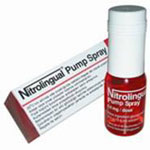Medical Emergencies
Angina
This page discusses angina, a fairly common condition, and one can usually be readily managed by a prepared dental team should a patient have an attack at the dental surgery.

I understand. Do not show this message again.
The video provides essential information about angina, a type of chest pain caused by narrowed arteries that restrict blood supply to the heart. It explains that angina attacks can be triggered by physical exertion, stress, or excitement, though those with unstable angina may experience unpredictable attacks without clear triggers. While angina itself is not life-threatening, it significantly increases the risk of serious issues such as heart attacks or strokes.
Key symptoms of an angina attack are outlined, which include chest pain that may radiate to the jaw or arms, shortness of breath, sudden extreme fatigue, and feelings of anxiety. The video emphasises the importance of immediate response when someone is experiencing an angina attack. Recommendations include advising the affected person to stop what they are doing and rest in a comfortable position, and if they have prescribed medication, they should take it.
If the pain lasts longer than five minutes, the person is encouraged to take a second dose of their medication. If pain persists after 15 minutes, it is very important to call for an ambulance. Additionally, if an individual does not have medication and their pain does not subside with rest, an ambulance should be contacted immediately.
For cases where pain resolves completely within 15 minutes of rest or medication, the individual can usually resume their previous activities, provided they are not overly strenuous. However, if there are any concerns regarding the attack, seeking medical advice is advisable. Overall, the video provides a clear outline of recognising and managing angina attacks, which is valuable information for dental professionals and their teams.
If you prefer to view this page as didactic information, rather than as a self assessment, click the arrow below.
Didactic Information:
Click here
Angina (more properly called Angina Pectoris) is severe chest pain caused by a lack of blood / oxygen to the heart muscle. It occurs when coronary blood flow is restricted because the coronary arteries are narrowed by an obstruction, or spasm. An increased demand for blood / oxygen (for example when the heart rate rises) can not be met, and pain is the result.
Angina is not a good predictor of a heart attack (myocardial infarction – MI ), and similarly lack of pain does not mean there won’t be an MI.
Who gets it?
Angina is more likely in people who smoke, have diabetes, have high cholesterol or high blood pressure. Also more common if there is a sedentary lifestyle, or a family history of heart disease.
Signs & Symptoms
There is a discomfort in the chest described as tightness, or burning. A patient who knows they suffer with angina will recognise the symptoms.
Precautions
If the patient is known to have angina, ensure they bring their medication with them to the surgery.
Ensure that Glyceryl trinitrate (GTN) spray (400micrograms / dose) is present and unexpired in the Emergency Drug Kit.
Ensure that emergency oxygen is available.
Fear and anxiety can precipitate an angina attack: ensure the patient’s general management minimises these.
Ensure the patient knows that, if they are late for an appointment, they need not rush – the Practice will understand their difficulty.
Management
If the patient has a history of angina, they may carry medication with them, usually Glyceryl Trinitrate (spray or tablets), or Isosorbide Dinitrate tablets. They should use their own medication as they will probably know how best to manage themselves.
If not, Glyceryl Trinitrate (from the emergency kit) should be sprayed under the tongue, and the mouth closed. It should not be inhaled.
If the attack is mild, when it has fully resolved, dental treatment may be continued at the Dentist’s discretion.
However, if the pain is severe, or doesn’t respond within a few minutes to medication, dental treatment should be discontinued, oxygen administered, and an ambulance called.
Self Assessment
What is the full name for angina?
What is angina, and when does it occur?
Is angina a good predictor for a heart attack (myocardial infarction) ?
What predisposes a person to suffer from angina?
What are the signs and symptoms of an angina attack?
If you know a patient suffers from angina, what precautions can you take to minimise the risks of an attack at the dental practice?
How would you manage an angina attack at the dental surgery?

